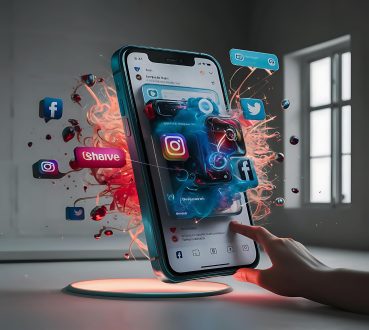- Empty cart.
- Continue Shopping
The Role of Social Media in Marketing Your Skincare Brand
The Role of Social Media in Marketing Your Skincare Brand
Social media has become a cornerstone of marketing for skincare brands. It allows businesses to engage directly with customers, showcase their products, and build a loyal following. Whether you’re launching a new skincare line or promoting an established brand, social media can significantly boost your visibility and drive sales. Here’s an in-depth look at the role of social media in marketing your skincare brand and how to make the most of it.
1. Builds Brand Awareness
- Why It’s Important: Social media provides a platform to introduce your skincare brand to a wider audience. It’s a space where you can share your brand’s story, values, and mission, making it easier for potential customers to discover and connect with you.
- How to Do It: Use platforms like Instagram, Facebook, TikTok, and Pinterest to share your brand’s content. Create a visually appealing profile that showcases your products, ingredients, and behind-the-scenes content. Engage with followers through stories, reels, and posts to increase visibility.
Tip: Use consistent branding across all social media platforms. Your logo, colors, and messaging should be easily recognizable to build brand familiarity.
2. Showcases Your Products and Ingredients
- Why It’s Important: Customers are often interested in the ingredients and benefits of skincare products. Social media is an effective way to educate them about what makes your products unique.
- How to Do It: Create posts that highlight the key ingredients in your products and their benefits. Use high-quality images, videos, and infographics to show the texture, consistency, and packaging of your products. Use carousel posts or videos to demonstrate how to use your products effectively.
Tip: Share ingredient spotlight posts or skincare tips to engage with your audience and position your brand as an authority in the skincare industry.
3. Engages Your Target Audience
- Why It’s Important: Social media allows you to interact directly with your customers, respond to questions, and gather feedback. Engaging your audience builds trust and loyalty.
- How to Do It: Use polls, Q&A sessions, and interactive stories to encourage followers to engage with your content. Respond to comments and direct messages promptly to create a sense of community. Host giveaways or contests to increase engagement and reach.
Tip: Use a friendly and approachable tone in your responses to make followers feel valued and heard.
4. Generates User-Generated Content and Social Proof
- Why It’s Important: User-generated content (UGC) and social proof are powerful tools for building credibility. They show potential customers that others have tried and enjoyed your products, making them more likely to make a purchase.
- How to Do It: Encourage customers to share their experiences using your products by tagging your brand or using a branded hashtag. Share customer reviews, testimonials, and UGC on your social media profiles. Create a sense of community by featuring loyal customers on your page.
Tip: Create a branded hashtag that’s easy to remember and encourages customers to share their experiences with your products.
5. Leverages Influencer Marketing for Brand Promotion
- Why It’s Important: Influencer marketing is a popular strategy in the skincare industry. It allows you to tap into an influencer’s audience and gain credibility through trusted endorsements.
- How to Do It: Partner with influencers who align with your brand values and target audience. Send them your products for honest reviews or sponsored content. Use a mix of micro-influencers (with smaller but engaged followings) and larger influencers to reach a diverse audience.
Tip: Focus on authenticity. Choose influencers who genuinely enjoy your products and can speak to their benefits in a relatable way.
6. Drives Traffic to Your Website and Online Store
- Why It’s Important: Social media acts as a gateway to your online store, driving traffic and increasing sales. It helps potential customers learn more about your products and make informed purchasing decisions.
- How to Do It: Use clear calls-to-action (CTAs) in your posts, such as “Shop Now,” “Learn More,” or “Link in Bio.” Share links to your website or specific product pages in your profile, stories, and captions. Use shoppable posts on platforms like Instagram and Facebook to make purchasing easier for customers.
Tip: Optimize your social media bios with links to your website, product pages, and any current promotions.
7. Provides Valuable Customer Insights and Analytics
- Why It’s Important: Social media platforms provide analytics that can help you understand your audience better. This data is valuable for tailoring your content, improving engagement, and refining your marketing strategy.
- How to Do It: Track metrics like engagement rates, reach, impressions, and follower demographics. Use insights to identify which types of content perform best and when your audience is most active. Adjust your content strategy based on this data to optimize results.
Tip: Experiment with different types of content (photos, videos, infographics) and track their performance to see what resonates most with your audience.
8. Creates a Platform for Customer Support and Communication
- Why It’s Important: Social media offers a direct line of communication between your brand and customers. It’s a space where you can provide customer support, answer inquiries, and address any concerns promptly.
- How to Do It: Use social media to handle customer inquiries, complaints, and feedback professionally. Create a dedicated highlight or pinned post for FAQs to address common questions. Respond to comments, messages, and reviews quickly to show that you value customer satisfaction.
Tip: Set up automated responses for common questions in direct messages, but follow up with a personal touch for more complex inquiries.
9. Allows for Creative Marketing Campaigns
- Why It’s Important: Social media platforms are perfect for launching creative marketing campaigns. They allow you to test new ideas, attract attention, and engage with your audience in fun and interactive ways.
- How to Do It: Use stories, reels, and live videos to share exciting product launches, behind-the-scenes content, or limited-time offers. Consider running seasonal campaigns or creating a series around a particular skincare topic. Use hashtags and engage with trending topics to increase visibility.
Tip: Plan campaigns around popular events or holidays to tap into seasonal trends and create a sense of urgency.
10. Strengthens Brand Loyalty and Community Building
- Why It’s Important: Loyal customers are likely to make repeat purchases and recommend your products to others. Social media provides a space to foster a strong community around your brand.
- How to Do It: Use your platform to share customer stories, celebrate milestones, and thank your followers for their support. Encourage followers to join your email list or private Facebook group for exclusive content. Use social media to educate your audience on skincare tips, product benefits, and industry trends.
Tip: Consistency is key. Regular posting, engagement, and staying true to your brand’s voice helps build a loyal community.
Common Social Media Challenges and How to Overcome Them
- Inconsistent Posting: Posting inconsistently can lead to a drop in engagement. Create a content calendar to schedule regular posts, stories, and campaigns.
- Low Engagement Rates: If your content isn’t resonating, analyze your metrics and adjust your strategy. Experiment with different types of content to see what your audience enjoys most.
- Negative Feedback: Criticism is inevitable, but how you handle it matters. Respond professionally and address the concerns transparently to maintain a positive brand image.
Benefits of Using Social Media for Your Skincare Brand
- Cost-Effective Marketing: Social media is a budget-friendly way to reach a large audience compared to traditional advertising.
- Targeted Advertising: Platforms like Facebook and Instagram allow you to create highly targeted ads based on demographics, interests, and behaviors.
- Builds Trust: Engaging content, customer reviews, and transparent communication help build trust and credibility.
- Increases Visibility: A strong social media presence increases your brand’s visibility, making it easier for potential customers to discover your products.
Conclusion: Leveraging Social Media for Your Skincare Brand
Social media is a powerful tool for marketing your skincare brand. It allows you to build brand awareness, engage with customers, showcase your products, and drive sales. By creating compelling content, leveraging influencer partnerships, and monitoring analytics, you can grow your online presence and foster a loyal community. With the right strategy, social media can become a valuable asset that propels your skincare business to new heights.
Interested in creating your own product line? Explore our private labeling options and bring your brand vision to life. Fill out our Form to get started.
Discover more about our services by visiting our website.

